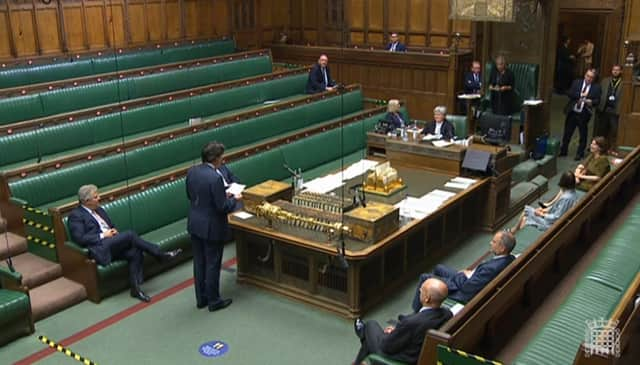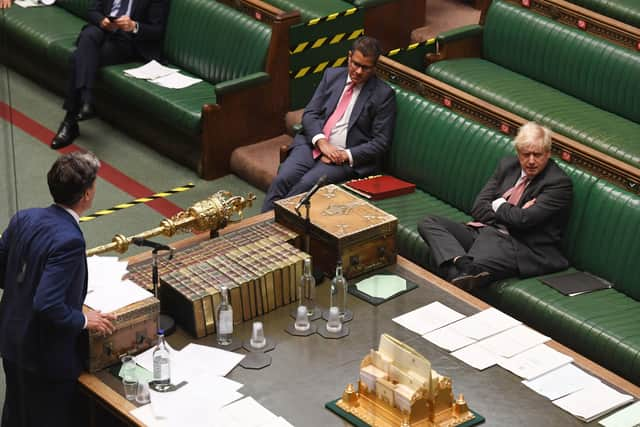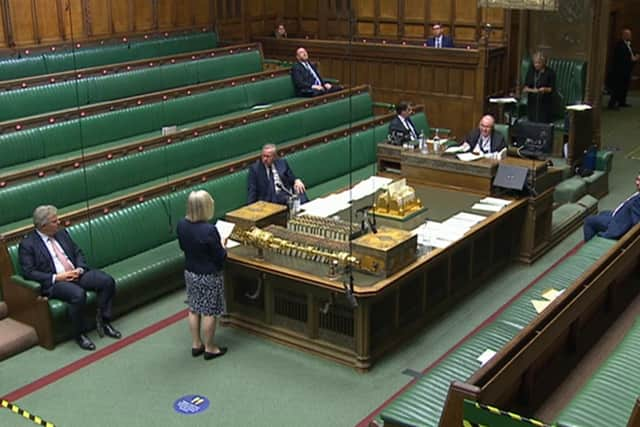Boris Johnson’s controversial internal market bill easily passes first stage in the House of Commons


MPs voted to give the UK Internal Market Bill a second reading by 340 to 263 — a government majority of 77.
The prime minister said the legislation was necessary to prevent the EU taking an “extreme and unreasonable” interpretation of the provisions in the Withdrawal Agreement relating to Northern Ireland.
Advertisement
Hide AdAdvertisement
Hide AdHe said some in Brussels were now threatening to block UK agri-food exports to the EU and to insist on tariffs on all goods moving to Northern Ireland from the rest of the UK.


However some senior Conservatives warned they could not support the legislation in its present form after ministers admitted last week that it breached international law.
MPs will begin detailed line-by-line scrutiny of the Bill on Tuesday, with votes expected next week on amendments to the Northern Ireland provisions which some Tories may back.
Even before the debate began, former prime minister David Cameron expressed his “misgivings” and former chancellor Sajid Javid and former attorney general Geoffrey Cox said they could not support the overwriting of the Withdrawal Agreement.
Advertisement
Hide AdAdvertisement
Hide AdThe intervention by Mr Cameron — who said passing legislation which breaks international treaty obligations was “the very, very last thing you should contemplate” — means all five living former prime ministers have spoken out against the Bill.


In the Commons, Mr Johnson — who took the unusual step of opening the debate himself — said the “protective” measures were necessary because the EU was now trying to “leverage” the Northern Ireland protocol in the talks on a post-Brexit free trade deal.
He said Brussels negotiators were threatening to ban the sale of UK agri-food products anywhere in the EU, creating an “instant and automatic” prohibition on the movement of such goods from Great Britain to Northern Ireland.
“Absurd and self-defeating as that action would be even as we debate this matter, the EU still have not taken this revolver off the table,” he said.
Advertisement
Hide AdAdvertisement
Hide AdMr Johnson said some on the EU side even wanted to designate all goods moving from Britain to Northern Ireland as being “at risk” of entering the EU single market, making them liable to EU tariffs.
He said it could mean levies of 61% on Welsh lamb, 90% on Scottish beef and 100% on Devonshire clotted cream, and would “carve tariff borders across our own country”.
“We cannot have a situation where the very boundaries of our country could be dictated by a foreign power or international organisation,” he said.
“No British prime minister, no government, no parliament could ever accept such an imposition.”
Advertisement
Hide AdAdvertisement
Hide AdFor Labour, shadow business secretary Ed Miliband — standing in for Sir Keir Starmer who is in coronavirus self-isolation — said Mr Johnson had only himself to blame for signing up to the Withdrawal Agreement.
“Either he wasn’t straight with the country about the deal in the first place or he didn’t understand it,” Mr Miliband said.
“Because a competent government would never have entered into a binding agreement with provisions it could not live with.”
A number of Conservative former ministers made clear that they would not support any measure which breached international law, including Andrew Mitchell, Sir Oliver Heald and another former attorney general Jeremy Wright.
Advertisement
Hide AdAdvertisement
Hide AdSir Charles Walker, the vice-chairman of the powerful Tory backbench 1922 Committee, and Wakefield MP Imran Ahmad Khan — a member of last year’s new intake of Conservative MPs — said they would not be supporting the Bill at second reading.
Sir Bob Neill, the chairman of the Commons Justice Committee who has tabled an amendment requiring a vote of Parliament before ministers can exercise the new powers in the Bill, urged MPs to “take the opportunity to change and improve these clauses”.
Earlier the intervention of Mr Cox, a committed Brexiteer, was seen as particularly significant as he was attorney general when Mr Johnson signed the Withdrawal Agreement and his legal advice was crucial in the negotiations.
He told Times Radio the Government “knew” what it was signing up to when it ratified the Withdrawal Agreement.
Advertisement
Hide AdAdvertisement
Hide Ad“The breaking of the law leads ultimately to very long-term and permanent damage to this country’s reputation and it is also a question of honour to me,” he said.
“We signed up, we knew what we were signing, we simply can’t seek to nullify those ordinary consequences of doing that and I simply can’t support that.”
——— ———
A message from the Editor:
Thank you for reading this story on our website. While I have your attention, I also have an important request to make of you.
With the coronavirus lockdown having a major impact on many of our advertisers — and consequently the revenue we receive — we are more reliant than ever on you taking out a digital subscription.
Advertisement
Hide AdAdvertisement
Hide AdSubscribe to newsletter.co.uk and enjoy unlimited access to the best Northern Ireland and UK news and information online and on our app. With a digital subscription, you can read more than 5 articles, see fewer ads, enjoy faster load times, and get access to exclusive newsletters and content. Visit https://www.newsletter.co.uk/subscriptions now to sign up.
Our journalism costs money and we rely on advertising, print and digital revenues to help to support them. By supporting us, we are able to support you in providing trusted, fact-checked content for this website.
Alistair Bushe
Editor